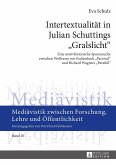This study of Wolfram's Parzival concentrates on service for riches in medieval knighthood. The epic is interpreted as a conflict between reciprocal feudal loyalty and self-centered mercenary service. The actions of Gahmuret, Anfortas, Parzival, and Feirefiz are held up against the historical background of the crusades, where service for abstract ideals is undermined by service for material gain. Although the power of riches is subdued by the sword in the end, the author maintains that the Parzival is an heroic defense of feudal values in an historical state of decline. He also criticizes traditional Parzival interpretations based on the chivalric system of the virtues, religious didactics, courtly love relationships, and dynastic relationships.
Bitte wählen Sie Ihr Anliegen aus.
Rechnungen
Retourenschein anfordern
Bestellstatus
Storno








